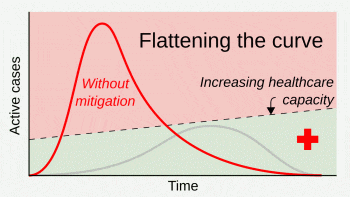What You Should Know
About the Coronavirus
Person to Person
- People who are within 6 feet of each other
- Through respiratory droplets spread through sneezing, coughing or talking
Contact with Contaminated Surfaces
- By touching a surface with the virus on it then touching the mouth, nose, or eyes.
You could be at higher risk for COVID-19 if you:
- Have HIV
- Asthma
- Are over 65 years old
- Have chronic lung disease
- Have a serious heart condition
- Have diabetes
- Are otherwise immunocompromised
Flattening the curve is reducing the number of infections at one time, in order not to overwhelm the healthcare system.

By RCraig09 – Own work, CC BY-SA 4.0, https://commons.wikimedia.org/w/index.php?curid=88883759
A pandemic is a global outbreak of disease. Pandemics happen when a new virus emerges to infect people and can spread between people sustainably. Because there is little to no pre-existing immunity against the new virus, it spreads worldwide.
What You Can Do
To Protect Yourself
- Wash your hands often with soap and water for at least 20 seconds especially after you have been in a public place, or after blowing your nose, coughing, or sneezing.
- Avoid touching your eyes, nose, and mouth with unwashed hands.
- Social Distance
- Avoid close contact with people who are sick
- Stay home as much as possible
- Put distance between yourself and other people.
- Keeping distance from others
- Clean and Disinfect
- Clean AND disinfect frequently touched surfaces daily. This includes tables, doorknobs, light switches, countertops, handles, desks, phones, keyboards, toilets, faucets, and sinks.
- If surfaces are dirty, clean them. Use detergent or soap and water prior to disinfection.
- Then, use a household disinfectant. Such as Lysol.
To Protect Others
- Cloth Face Covers
- Everyone should wear a cloth face cover when they have to go out in public, for example to the grocery store or to pick up other necessities.
**DO NOT put face covers on children under 2 years old**
- The cloth face cover is meant to protect other people in case you are infected.
- Cover Coughs and Sneezes
- If you do not have on your cloth face covering, remember to always cover your mouth and nose with a tissue when you cough or sneeze or use the inside of your elbow.
- Throw used tissues in the trash.
- Immediately wash your hands with soap and water.
If You Get Sick
- Stay Home
If you are sick, do not leave your home unless it is for medical attention.
- Get Rest/Drink Water
Many people will recover without medical attention.
Resting and Hydrating is the best thing you can do to help your body fight the virus.
- Monitor Symptoms
If you have:
- Trouble breathing
- Persistent pain or pressure in the chest
- New confusion or inability to arouse
- Bluish lips or face
Seek medical attention!
Click here for a list of testing sites.
Call 911 if you have a medical emergency
- Stay Away From Other People
As much as possible, stay in a specific room and away from other people in your home. Also, you should use a separate bathroom, if available. If you need to be around other people in or outside of the home, wear a cloth face covering.
- Call Your Healthcare Provider
Always call before you visit your doctor.
If you have questions please contact Janika Grimlund.
Or visit CDC.gov